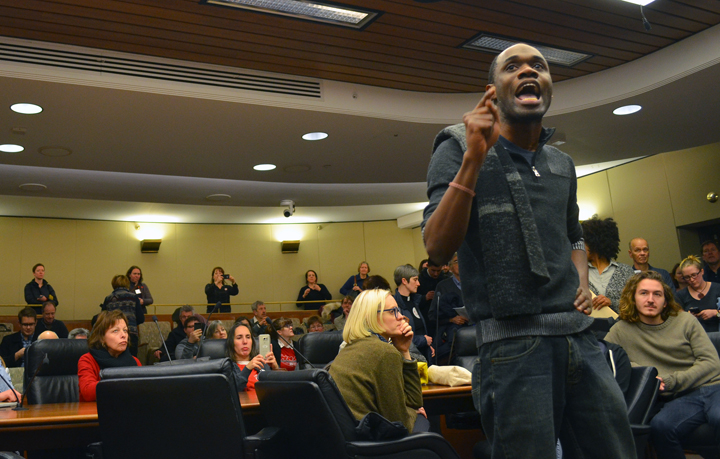

Share
Corporate special interests clashed with working people during a Capitol hearing on legislation that would roll back ordinances extending earned sick and safe time to an estimated 150,000 workers in Minneapolis and St. Paul.
The local preemption bill, authored by Rep. Pat Garafalo, R-Farmington, passed its first committee hearing Feb. 2 after a lengthy round of public testimony. A companion bill in the Senate will receive its first committee hearing Monday, Feb. 6. Opponents plan to pack that hearing as well.
The measure would restrict local governments from establishing higher employment standards – like earned sick time, fair scheduling and minimum wage – within their boundaries. Additionally, it would strike down any such ordinances passed after Jan. 1, 2016, nulling historic victories on earned sick time in Minneapolis and St. Paul.
Minnesota Nurses Association director Rose Roach, who co-chaired a citizen task force that helped draft St. Paul’s sick time ordinance, called Garafalo’s bill “an end run around the will of the people” in her city.
Roach was among dozens of people who lined up to testify on the measure before the House jobs committee. An overflow crowd spilled into two additional hearing rooms, and the committee’s decision to take a dinner break – passed by a party-line, roll-call vote – drew groans from those still waiting for their chance to speak.
A diverse group of working people, religious leaders and small business owners voiced concerns with the bill, which they called a corporate power grab.
“We see what’s going on here,” Javen Swanson, pastor at Gloria Dei Lutheran Church in St. Paul, told committee members. “Businesses don’t want to expand worker benefits or increase wages. And with vast resources and an army of lobbyists in Washington and here in St. Paul, they usually get their way.”
Indeed, lobbyists for several industry associations and trade groups – representing restaurants, banks, temp agencies and others – spoke in favor of stripping local governments of their power to set higher workplace standards. A “patchwork” approach to workplace regulations, they warned, creates bookkeeping headaches for firms doing business across the state.
Doug Sams, owner of D. Brian’s catering, said his employees are like family, and he worried that different wage-and-benefit standards would drive a wedge between employees in different municipalities. “I’m looking at this as a challenge for me to keep my family together,” he said.
But one after the other, working people at the hearing came forward to express fear and outrage that state lawmakers would seek to undermine their efforts to secure the sick time necessary to care for themselves and their families.
“My whole working life I have been a number, and an easily replaceable number,” retail worker Katie Drahos, a member of Neighborhoods Organizing for Change, told committee members. “I have no say in the corporate world. My only saving grace is that I am able to lobby for my interests at a city level.”
“We get sick because we are human beings, so we need sick time,” SEIU Local 26 member Kadra Ali of St. Paul said. “If I miss one day at my job because I’m sick, I miss my check, or if I stay with my children when they get sick.”
Several small business owners joined workers in opposition, including Todd Mikkelson, a small business owner from Orono. While corporations and industry associations might have the ear of state and national lawmakers, he said, Main Street businesses have the ear of their local officials.
“To take away our local control of things is nothing more than an intrusion,” Mikkelson said. “City councils are listening to us constantly. We have much easier access to them, and they are our neighbors. To stifle them is to stifle us.”
If it’s uniformity corporate interests want, Swanson offered a proposal: “Let’s use St. Paul’s sick time ordinance as a model for statewide legislation that protects the most vulnerable members of our communities,” he said.

